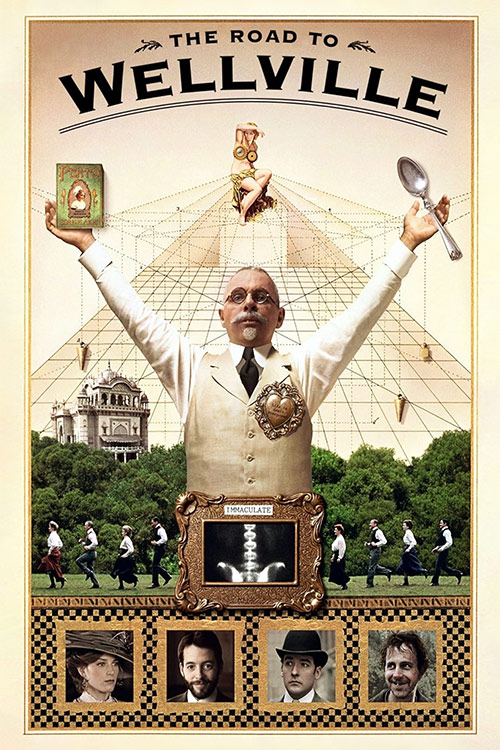|
The Road to Wellville was published by Viking in 1993, and until the advent of The Tortilla Curtain, was my most widely-read book. It reflects my fascination with (and comic trepanning of) the health food movement in the early part of the nineteenth century. The book is focused around an actual historical figure, Dr. John Harvey Kellogg, inventor of the cornflake and founder of the renowned spa, The Battle Creek Sanitarium. A host of invented characters share the stage with Dr. Kellogg, including the Lightbodys (Will and Eleanor--she is a true "Battle Freak" and he has lost his powers of digestion to steak, booze and the Sears White Star Liquor Cure) and Charlie Ossining, a comically naive entrepreneur, eager to cash in on the breakfast food craze. Indeed, breakfast foods, as they were then called, were a source of entrepreneurial frenzy in the way of the Internet stocks of today. Life at the San was pretty bleak, by my way of thinking. Here, for example, is what you might get for breakfast at this sterling spa and resort for the health-minded: Nut Lisbon Steak, Protose Patties, Nuttolene & Jelly, Corn Pulp, Sliced Banana with Beaten Meltose, Granuto, Graham Grits and much more. And you could wash it all down with Kumyss, Kaffir Tea, Sanitas Koko and the like. Finally, as many of you will know, The Road to Wellville was made into a Columbia Pictures film by Alan Parker in 1994. Anthony Hopkins plays the good doctor, John Cusack plays Charlie Ossining, Matthew Broderick is Will Lightbody and Bridget Fonda his wife, Eleanor, and Dana Carvey memorably plays Dr. Kellogg's errant adoptive son, George. A brief excerpt follows below. |
| Excerpt from The Road to Wellville |

|
| Reviews |
EXCERPT FROM THE ROAD TO WELLVILLE:
CHAPTER 1: OF STEAK AND SIN
Dr. John Harvey Kellogg, inventor of the corn flake and peanut butter, not to mention caramel-cereal coffee, Bromose, Nuttolene and some seventy-five other gastrically correct foods, paused to level his gaze on the heavyset woman in the front row. He was having difficulty believing what he'd just heard. As was the audience, judging from the gasp that arose after she'd raised her hand, stood shakily and demanded to know what was so sinful about a good porterhouse steak--it had done for the pioneers, hadn't it? And for her father and his father before him?
The Doctor pushed reflectively at the crisp white frames of his spectacles. To all outward appearances he was a paradigm of concentration, a scientist formulating his response, but in fact he was desperately trying to summon her name--who was she, now? He knew her, didn't he? That nose, those eyes . . . he knew them all, knew them by name, a matter of pride . . . and then, in a snap, it came to him: Tindermarsh. Mrs. Violet. Complaint, obesity. Underlying cause, autointoxication. Tindermarsh. Of course. He couldn't help feeling a little self-congratulatory flush of pride--nearly a thousand patients and he could call up any one of them as plainly as if he had their charts spread out before him . . . . But enough of that--the audience was stirring, a monolithic force, one great naked psyche awaiting the hand to clothe it. Dr. Kellogg cleared his throat.
"My dear Mrs. Tindermarsh, I do thank you for your question," he began, hardly able to restrain his dainty feet from breaking into dance even as the perfect riposte sprang to his lips, "but I wonder how many of those flesh-abusing pioneers lived past the age of forty?" (A murmur from the audience as the collective image of a skeletal man in a coonskin cap, dead of salt pork and flapjacks, rose before their eyes.) "And how many of them, your own reverend forebears not excepted, went to bed at night and had a minute's sleep that wasn't racked with dyspepsia and the nightmare of carnal decay?" He paused to let that horrible thought sink in. "I say to you, Mrs. Tindermarsh, and to the rest of you ladies and gentlemen of the audience, and I say it with all my heart"--pause, two beats--"a steak is every bit as deadly as a gun. Worse. At least if one points a gun at one's head and pulls the trigger, the end comes with merciful swiftness, but a steak--ah, the exquisite and unremitting agonies of the flesh eater, his colon clogged with its putrefactive load, the blood settling in his gut, the carnivore's rage building in his brittle heart--a steak kills day by day, minute by minute, through the martyrdom of a lifetime."
* * *